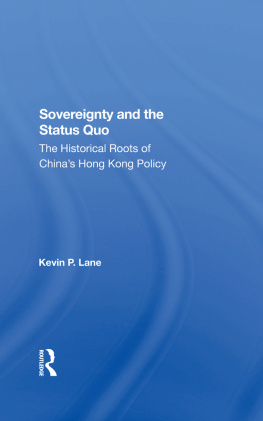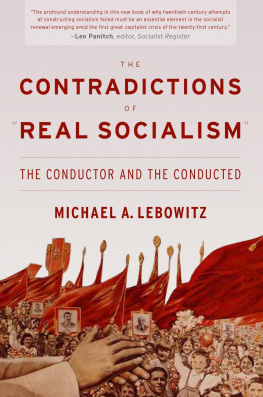First published 1976 by Westview Press, Inc.
Published 2019 by Routledge
52 Vanderbilt Avenue, New York, NY 10017
2 Park Square, Milton Park, Abingdon, Oxon OX14 4RN
Routledge is an imprint of the Taylor & Francis Group, an informa business
Copyright 1976 by George Allen & Unwin Ltd
All rights reserved. No part of this book may be reprinted or reproduced or utilised in any form or by any electronic, mechanical, or other means, now known or hereafter invented, including photocopying and recording, or in any information storage or retrieval system, without permission in writing from the publishers.
Notice:
Product or corporate names may be trademarks or registered trademarks, and are used only for identification and explanation without intent to infringe.
Library of Congress Cataloging in Publication Data
Lane, David Stuart.
The socialist industrial state.
Bibliography: p.
Includes index.
1. Communist state. I. Title.
JC474.L25 321.9'2 75-33036
ISBN 13: 978-0-367-28778-8 (hbk)
Before beginning the study of the social system I have chosen to call 'state socialism', it is necessary to define the term and to describe the societies to which it is held to apply. A society may be defined as a behavioural system having three components: a distinct set of central or dominant value and beliefs, a number of social institutions, and patterns of interactions between individuals and institutions. What, then, are the distinguishing features of state socialism? The dominant values are those of Marxism-Leninism, and the peculiar institutions of the system stem from the state-owned means of production which determine man's relationship to property. The values laid down in the charter of the society are those of socialism: that is, a system of beliefs focused on the ultimate perfectibility of man, on the determining influence of class forces operating through the laws of historical and dialectical materialism. In state-socialist societies, the dominant institution is the Communist Party, which is considered to lead the working class and provides an authoritative interpretation of the laws of historical development, which in turn legitimate the Party's own political power. The appellation state focuses on the central role played by government and Party institutions in the process of these societies: not only do ownership and control of the means of production legally reside with the state, but it has the authority to mobilise the population to achieve the goals defined in the 'official charter'. In the patterns of interactions between institutions, the state (government and ruling party) plays a dominant role. Let us now turn from analytical concepts to consider some historical generalisations.
While we shall consider important differences in the culture, the level of economic development and the political processes of different state-socialist societies, the historical developments of these states share many common features. First, the communists came to power in an alliance with other social-democratic or popular parties, and with the consolidation of the revolution such parties were weakened as independent political groups: they have been banned - as in Soviet Russia, amalgamated with the Communist Party - as was the fate of most social-democratic parties in East European countries, or reduced to the role of political interest groups subservient to the ruling party. Second, the process of revolution includes an attack on right-wing liberal-democratic groups: nationalisation deprived the bourgeoisie of industrial property and land and was often accompanied by political violence - by civil war, by terror. Third, a land reform at first gave to the peasantry the rights over the land they worked, though this later gave way to the collectivisation of agriculture (Poland and Yugoslavia being two important exceptions). Fourth, political policy is decided within the Communist Party and is often accompanied by internal conflict - by purges and political violence; politics remain endemic to state-socialist society. Fifth, economically, with the exception of Eastern Germany (GDR) and Czechoslovakia, all state-socialist countries were, relative to those of the advanced West, at a low level of economic development and they all pursued policies of rapid and extensive industrialisation. Sixth, following the consolidation of political power and parallel to the industrialisation drive, a cultural revolution was instituted which involved the introduction of mass education, widespread development of communications and the comprehensive development of social services.
The notion of state socialism may be contrasted with its linguistic opposites. Democratic socialism as in Sweden is a social system in which there is a plurality of institutions, including political parties, and in which the government does not play a dominant role and operates in a context of private property. Syndicalist socialism emphasises the devolution of power, limited state activity, and particularly workers' control. The term state capitalism will be discussed in detail later. In the first instance, however, it is regarded as inappropriate because 'capitalism' is associated with private appropriation of the means of production, and the term state capitalism has also been used to refer to societies in which the state has controlled private trade: as in Russia during the New Economic Policy, in wartime European states, such as Germany and the United Kingdom, and in countries such as Tsarist Russia where the state itself had a considerable stake in industrial ownership.
Widely conceived, state-socialist society includes such diverse countries as the Soviet Union, China, Poland, North Korea, Yugoslavia and Cuba. These may be grouped into European (including Cuba) and Asian powers (see Ionescu, 1967: 5). Politically they may be grouped into societies which came to power without direct intervention of Soviet troops - Yugoslavia, Albania, Czechoslovakia, China, North Vietnam, North Korea and Cuba - and those that did have such support - Poland, Rumania, Hungary, Eastern Germany (German Democratic Republic), Bulgaria. The governments of these latter countries, at least in their formative stages, were very much dependent on the direct or indirect presence of the Soviet Army.
In this book the Soviet Union has been selected as a central type of state-socialist system. This is because the values and goals of Marxism-Leninism and the particular institutions, the form of It is worthwhile to emphasise that state-socialist countries are relatively poor. It has been estimated that China (in 1969) had an average yearly per capita gross national product of 40, North Korea 110, Cuba 128, Poland 387, the USSR 489 and East Germany 619. By comparison, the United Kingdom's GNP was 825, Western Germany's 1,252 and that of the USA 1,943. Other countries which have followed the Soviet Union's path have been modelled on her and some are, or have been, to a considerable extent politically dependent on her. At the beginning of the 1970s 1,371 million people (about a third of the world's population) lived in state-socialist societies, including 42 million politically active Communist Party members (Mickiewicz, 1973: 222).










